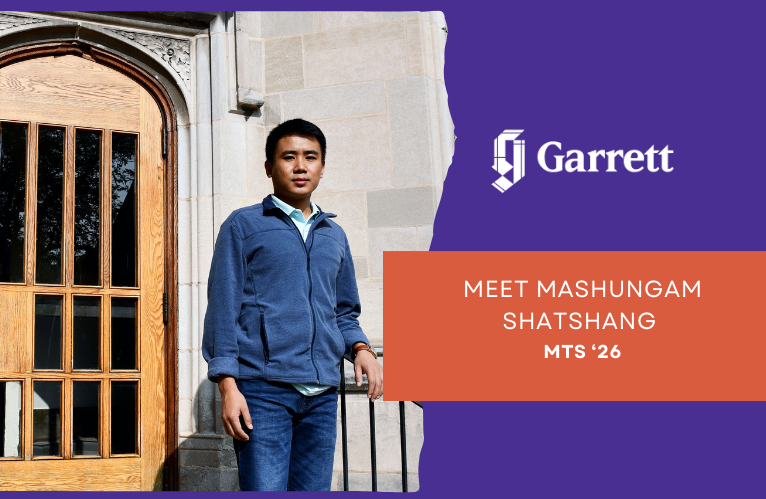Scholar for the Common Good
October 24, 2024
An interview with Mashungam Shatshang MTS ‘26

Political theology is always a fluid discipline—as ethicists and theologians respond to shifting culture—but dynamic growth in the number of international students who study at Garrett yields especially robust changes. When a classroom is likely to have students from several countries, including students who belong to persecuted communities or may even be studying in Evanston as political refugees, it changes the nature of group discussion. A conversation that might otherwise be hypothetical can become palpably real. It is precisely this context that attracted Mashungam Shatshang to the Master of Theological Studies program. “Garrett’s mission is to form courageous leaders for the thriving of the church and the healing of the world. Those words really caught my attention,” he says. “When you do theology in the middle of existential crisis, you must have courage.”
Mashungam grew up in a small district in the Indian state of Manipur, part of a Christian community that has been increasingly imperiled by Hindu nationalism and the attendant rise of Prime Minister Narendra Modi and the Bharatiya Janata Party (BJP). After he received his Bachelor of Divinity from Union Biblical Seminary, a Methodist institution in Pune, concerns about how theology can strengthen his country’s imperiled democracy sent him to Chicago seeking answers. “Right now, India is going through tremendous change. What the BJP envisions is not a proper Republic because it does not include, among others, the Christians and Muslims who have been an integral part of this nation since independence,” he says. “The question of how I can counter Hindutva for political civility based on the Constitution and rule of law is what sent me looking for resources in Christian theology that can bridge this gap.”
This pursuit, however, brought him to a perhaps-unexpected place: the field of patristics. “I have this sense that to go forward in the future, sometimes we must take a step back into the past,” he says. “I’ve been so moved by Saint Augustine’s conception of the common good, that a nation is defined by its pursuit of all people’s wellbeing, and want to wield that definition against the idea of Hindu nationhood proclaimed by the BJP.” It’s not just the ideas of Augustine that attract him, however, it’s also the style with which he approaches theology. “What I love best about Augustine is how he brings heart and mind together in what he writes,” Mashungam says. “That’s the way theology should be: We have to think critically about things, but we can’t lose touch with our emotions about what we study.”
This pursuit, however, brought him to a perhaps-unexpected place: the field of patristics. “I have this sense that to go forward in the future, sometimes we must take a step back into the past,” he says. “I’ve been so moved by Saint Augustine’s conception of the common good, that a nation is defined by its pursuit of all people’s wellbeing, and want to wield that definition against the idea of Hindu nationhood proclaimed by the BJP.” It’s not just the ideas of Augustine that attract him, however, it’s also the style with which he approaches theology. “What I love best about Augustine is how he brings heart and mind together in what he writes,” Mashungam says. “That’s the way theology should be: We have to think critically about things, but we can’t lose touch with our emotions about what we study.”
Indeed, as much as he is excited by his first semester’s classes, Mashungam also praises the way Garrett makes him feel. “The staff, faculty and senior students have been so hospitable, it’s made me know I’m welcome and brings me comfort,” he says. “Even visiting the lake, listening to the sound of waves and staring at the huge horizon, it helps me find calm in the knowledge that I’m part of a much larger history of humanity and salvation, which is still ongoing.” Sometimes, that grace just looks like finding a quiet place to study and reflect. “At the end of the library’s reading room, there’s one chair beside the last row of books. It’s where I go to read and be alone,” he confides.
After he graduates, Mashungam wants to return to Manipur, to nurture Christian community in his home state. “Right now, we have lots of concerns. Leadership crisis in the church, and a lack of sufficient theological institutions force people to move out of the state to study, which causes a drain on human resources. There’s also a potent political divided and a lack of theological engagement with the so-called secular,” he says. “So, I want to return and work on the social issues my community is facing, and how theology can respond.” Resolute in the conviction of that call, his voice steadies. “Too often, when you are in danger, it feels as though you are unable to speak your mind and then ignore those things that threaten your very existence,” he says with confidence. “We cannot wait for others. We must have the courage to be honest, to nurture change person by person, community by community, because that’s what leads to bigger changes.”

